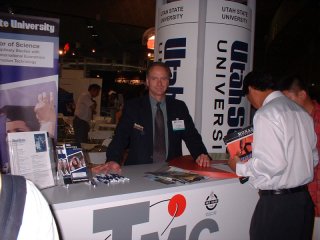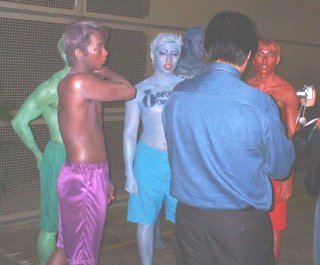OK, I just saw 'The Matrix Reloaded' and I really want to do a Transnational Ed post with a bigtime pop cultural jumping off point. No matter how much of a stretch it is. So here goes:
The premise of The Matrix is as old as Gnosticism, which appears to be pre-Christian. The cinematic visualization of the race of humans all tucked into their pods was shown in the first of the three flicks -- and it was powerful. It sure got seared into my brain. But the idea of people being largely unaware of how things really are and buying into an imposed, constructed version of reality permeates the history of religion and philosophy. Lack of originality is precisely why the story is so engaging. It draws on the whole tradition of secret knowledge and The One, and stimulates all the feelings we have about that way of looking at the world.
Remember, there are two parts to the claim:
1) The world that most people live in is a pretend world
2) Secret knowledge is required, and usually only one special spiritually developed individual can provide it, to free humanity and enable people to experience the real world
The Pretend World thought-form works at many levels. Social cohesion seems to require pretense. It reminds me of the way Russians described their work life in the years of disarray following the end of State Communism: The workers pretend to work and the bosses pretend to pay them.
There is so much pretending going on everywhere -- which is where I jump over to Transnational Ed. Historically, the obvious dreamworld that participants bought into was the idea that 'Twinning' and 'Franchising' arrangements produce equivalent educational experiences to what degree granting institutions provide at home. Courses are not just about the content they cover -- they are about the way the faculty at a given institution helps students get engaged with the content so that they can learn about it.
People who work in Transnational Ed must be plugged into the Matrix when they act as if the Mode 3 (Commercial Presence) style of service export resembles the way degree granting institutions normally provide their services.
And it gets worse. The major private providers in the key Asian markets have all developed proprietary e-learning systems. Informatics, the leading private provider in terms of volume and outreach, has its PurpleTrain. The Hartford Group, subject of yesterday's post, has its My ELearningPortal.
If you believe that the e-learning experience derived from riding the PurpleTrain is remotely equivalent to a typical university course, you are definitely plugged way into the Matrix.
And yet, there I was buying into the pretense along with everyone else at the Big Education Expo in Singapore back in March -- working my station in the TMC booth, right across from Informatics and their PurpleTrain

PurpleTrain and other serious educational services were promoted by having half naked male models parade around painted in some strong color, including purple.

I'm not making this up.
. . . . . . . .
How about the second part of the Gnostic claim -- the esoteric part about The One?
Here is where the metaphor becomes dangerous.
The Russian workers who knew they were pretending kept on doing it anyway. Why?
Because even though they knew it was absurd, they could construct no other plausible scenario on their own. They were, in effect, waiting for The One, or at least Some One, to come along and change things.
Frankly, I'm not so sure there is a The One, in Transnational Ed or anything else. Or if there is, I'm not so sure that he, she, or it wouldn't want us wake up on our own and start taking serious responsibility for our own education, among other things.
Whatever it is we think we need a leader for, we are diminishing in ourselves in that way.
E-Learning in general, and Transnational Ed as one arena in which e-learning will be used, will improve when we unplug ourselves from the Matrix, acknowledge the shortcomings, and start creating new and better teaching models. Lots of people need to do this. The peer-to-peer networks emerging, through blogs among other things, are part of what will allow this to happen.
I hope.

